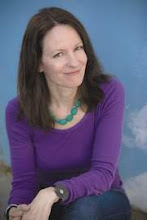Author readings: They're happening in bookstores, bars, libraries, and now, private homes [
see Poets & Writers article: "thanks to a growing trend in grassroots marketing and publicity, writers in the San Francisco Bay area are reading to packed houses—literally.] I've been inspired through the years by attending some fascinating readings from authors, and bored by a few readings, as well-- mostly because authors read too long. [I aspire to inspire, but I'm sure I've launched a few yawns in my own readings.]
Now that I'm heading up the Emrys
"Reading Room" committee--organizing a local reading series-- I've been pondering how we can punch up the event. We've decided to add a Q&A session after every reading, to encourage conversation about the process of writing. The audience is often eager to learn more about how poets and writers move from idea to printed page. We'll also encourage authors to limit their readings to about 20 minutes, since there are two readers at each event.
Elementary, you say? Well, we've got some other tricks up our sleeves [sorry, but no free wine or beer-- THAT would be a punchy reading series.] We'd like to tape a few minutes of each reading to post online, for example. And encourage the audience to mingle and linger after readings...to buy books, of course, but also to bond.
Anybody have any dreamy or nightmarish tales of author readings--anywhere, anytime? Do tell-- comment or email me. I'd love to know!Meanwhile, if you're in Upstate SC, don't miss
the Emrys Reading Room series, as it kicks off tonight with
Brian Ray and Joni Tevis, Monday, Aug. 24, 7 pm at the Handlebar, 304 East Stone Avenue, Greenville, SC 29601. Here's more about the featured authors:
Brian Ray grew up in Georgia and then moved to South Carolina, where he spent summers at a steel plant and went to college at the University of South Carolina. He finished an MFA there in 2007, after three years of plugging away at a novel based on life at the mill and some of the wildest things about Columbia and the Palmetto State.
Through the Pale Door (Hub City 2009) won the SC First Novel Prize and was a finalist for the Next Generation Indie Book Awards for the debut novel. His work has appeared in Green Mountains Review, Big Muddy, New South, Timbercreek Review, and other journals.
Joni Tevis is from Easley, South Carolina, and earned her PhD in literature and creative writing from the University of Houston Creative Writing Program. Her work has been published in Isotope, Shenandoah, Conjunctions, Pleiades, The Bellingham Review, North Dakota Quarterly, Plenty, and elsewhere.
The Wet Collection, her book of lyric essays, was published in August 2007 by Milkweed Editions. In this collection, the narrator navigates the peril and excitement of an outward journey complicated by an inward longing for home. Tevis especially likes to explore relationships – how one element in an environment interacts with other elements. At present, she teaches in the English department at Furman University.

















